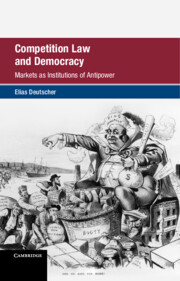Book contents
- Competition Law and Democracy
- Global Competition Law And Economics Policy
- Competition Law and Democracy
- Copyright page
- Dedication
- Contents
- Preface
- Introduction
- Part I The Historical and Conceptual Foundations of the Competition–Democracy Nexus
- Part II The Operationalisation of the Competition–Democracy Nexus
- Part III The Decline of the Competition–Democracy Nexus
- 6 The Making of Laissez-Faire Antitrust
- 7 The Operationalisation of Laissez-Faire Antitrust and the Decline of Republican Liberty
- Part IV The Revival of the Competition–Democracy Nexus
- Bibliography
- Table of Names
- Table of Cases US
- Table of Cases EU
- Table of Legislation
- Index
6 - The Making of Laissez-Faire Antitrust
from Part III - The Decline of the Competition–Democracy Nexus
Published online by Cambridge University Press: 21 November 2024
- Competition Law and Democracy
- Global Competition Law And Economics Policy
- Competition Law and Democracy
- Copyright page
- Dedication
- Contents
- Preface
- Introduction
- Part I The Historical and Conceptual Foundations of the Competition–Democracy Nexus
- Part II The Operationalisation of the Competition–Democracy Nexus
- Part III The Decline of the Competition–Democracy Nexus
- 6 The Making of Laissez-Faire Antitrust
- 7 The Operationalisation of Laissez-Faire Antitrust and the Decline of Republican Liberty
- Part IV The Revival of the Competition–Democracy Nexus
- Bibliography
- Table of Names
- Table of Cases US
- Table of Cases EU
- Table of Legislation
- Index
Summary
This chapter analyses the decline of the concern about liberty as non-domination and the idea of a competition–democracy nexus following the ascent of the Chicago School and the rise of a More Economic Approach towards antitrust law on both sides of the Atlantic. It shows how the Chicago School not only challenged the economic foundations of the republican antitrust tradition but also put forward the consumer welfare standard as a versatile, principled framework to supersede the conception of republican liberty with a narrow negative notion of economic liberty as non-interference. The Chicago School thus shaped a laissez-faire approach to antitrust that seeks, in the first place, to preserve entrepreneurial liberty against state interference.
Keywords
- Type
- Chapter
- Information
- Competition Law and DemocracyMarkets as Institutions of Antipower, pp. 221 - 264Publisher: Cambridge University PressPrint publication year: 2024

